Light-truck diesel engines of five to 10 years ago weren't so good. They were noisy, vibrated, had smelly exhaust emissions, and were more costly to build than their gasoline-burning counterparts. Today's diesels are much more civilized, but are they any better than their gasoline cousins? This is one of the questions we're asked most frequently regarding 3⁄4- and 1-ton pickups. To answer this, you must understand the positive and negative attributes of each engine, while considering what you'll use the vehicle for. Let's look at the important criteria you should use before making a final decision.
Before we start, it's important to note there are currently no 1⁄2-ton pickups available with diesel engines, even though there are some small "baby" diesels under development for use in 1⁄2-tons and midsize SUVs. This story concentrates on 3⁄4- and 1-ton trucks, but the concepts will be equal once the next generation of smaller diesels arrives.
Power/Torque
Advantage: Split Decision Typically, gas engines make more horsepower, while diesels produce more torque. Are you looking for off-the-line acceleration of an unloaded truck? Maybe you use your truck around town where quick starts are important and you don't often tow a trailer or haul a load. If this is the case, then you'll want a gas engine. By design, gas engines rev faster and are able to reach higher rpm peaks than diesels. This allows them to attain greater horsepower numbers and quicker 0-60-mph times.
However, if towing capacity and brute pulling force are your game, a diesel is for you. The torque advantage of diesels is perfectly suited for pulling heavy loads up steep grades. Because of the relatively high-compression ratio necessary to ignite the diesel fuel (17:1 diesel versus 9:1 gas), a diesel makes all its torque and power low in the rev range. As an example, the GM 8.1L gasoline V-8 in Chevrolet and GMC pickups puts out 340 hp and 455 lb-ft of torque, while GM's 6.6L V-8 turbodiesel makes slightly less hp at only 300, but makes up for it in torque with a healthy 520 lb-ft of grunt.
Fuel Economy
Advantage: Diesel Diesel fuel has a higher energy density than gasoline. One gallon of diesel contains approximately 147,000 BTUs of energy, while a gallon of gasoline only has 125,000 BTUs. This means it takes more gasoline to equal the power output of diesel, making diesel engines more efficient per gallon of fuel burned. Also, because diesel engines use the more efficient direct fuel-injection method (fuel injected directly into cylinder) compared to the port fuel-injection setup in gas engines where gas is mixed with incoming air in the intake manifold, the diesel system has little wasted or unburned fuel. Diesels also use about one third as much fuel at idle as gasoline units. Even though there are no official EPA-mileage figures for 3⁄4-ton and bigger trucks, we've seen diesels get six to eight more mpg than similar-weight gas pickups. Over the life of the truck, this advantage could be significant, especially if you drive a lot of miles.
Initial Cost
Advantage: Gasoline Because of the high-compression ratios and resulting high cylinder pressure in diesel engines, they must be built to withstand more punishment than gas engines. Beefed-up parts include a thicker block and cylinder heads and stronger connecting rods, pistons, crankshaft, and valves. These parts can be costly. As an example, if you want to upgrade an '02 F-250 from the standard 5.4L V-8 to the 7.3L turbodiesel V-8, you're going to spend around $4800. However, to go from the 5.4L to the 6.8L V-10 gasoline engine, the price is a more manageable $600. Another diesel disadvantage that comes as a byproduct of needing heavy-duty components is increased weight. A diesel engine can weigh several hundred pounds more than a comparable gas model.
Noise/Vibration
Advantage: Gasoline Despite huge improvements in noise isolation and engine-noise technology in pickup trucks in the past 10 years, diesels are still louder and shake more than their gasoline brothers. However, a recent back-to-back drive in two Ford trucks, one equipped with a 5.4L gas V-8 and the other fitted with a 7.3L diesel V-8, demonstrated that diesels aren't that far behind. At idle, the clatter and shake of the diesel are clearly noticeable, while it's tough to tell if the gas engine is even running. Under low-speed acceleration, the diesel still makes more noise. But once you're up to speed, there's little difference between the two even when accelerating on the highway.
Cold Weather
Advantage: Gasoline Anyone who's tried to start a diesel engine on a cold winter morning knows the winner in this category. Diesels don't have spark plugs like gasoline engines do. The fuel is ignited spontaneously once it's injected into the cylinder that's already under pressure. When it's cold (below 30), the air isn't hot enough to ignite the diesel fuel. To help counter this, today's diesel pickup-truck engines use a computer that senses cylinder temperature and injects the fuel later in the engine rotation. By injecting the fuel when the piston is closer to top dead center, the cylinder is under more pressure and the air inside is hotter, which aids combustion. As an added measure, most modern diesels come equipped with a 110-volt heating element designed to keep the engine block warm when the truck is parked.
Exhaust Smell/Emissions
Advantage: Gasoline Despite petroleum companies best efforts at producing diesel fuel with lower sulfur levels, burned diesel fuel still smells much worse than burned gasoline. Beyond the smelly tailpipe, diesel lags behind gasoline in the areas of oxides of nitrogen (NOx) and particulate matter emissions. It's the particulate matter that causes the black soot seen emanating from diesel-vehicle tailpipes, while NOx is one of the components of smog. The next generation of diesel fuel is generally thought to improve on this situation.
Short-Term Maintenance
Advantage: Gasoline Regular maintenance on a diesel is more costly, thanks to several items including the larger volume of oil in the engine and the fact that fuel filters and water separators must be serviced more often. Modern gas engines have an even bigger advantage thanks to extended service intervals on spark plugs, engine oil, and antifreeze.
Long-Term Maintenance and Durability
Advantage: Diesel The flip side of a diesel-engine's expensive initial cost is its excellent durability. Dodge, Ford, and GM learned long ago they were better off buying diesel technology from experts such as Cummins, International, and Isuzu than spending tons of money developing it themselves. These manufacturers all have years of experience building heavy-duty, over-the-road diesels that have to log 100,000 miles a year for years on end, routinely haul heavy loads and may have to idle for days at a time. Think of the diesel engines found in GM, Ford, and Dodge pickups and SUVs as mini big-rig engines. The average gas engine is good for only around 125,000 miles before needing a rebuild and isn't designed to constantly pull a heavy load. A diesel can go more than three times this amount before needing an overhaul.
Fuel Cost
Advantage: Diesel Because diesel fuel is easier to refine, taking less time to get from raw petroleum to final product than gasoline, it's usually priced lower than gas. However, occasionally in the U.S., diesel is priced the same or more than regular unleaded gas. This is often because diesel isn't as desirable in some areas leading to higher diesel prices. However, diesel advocates say that if more people drove diesel light trucks and cars, the price would drop dramatically in these areas--and possibly throughout the country.
Fuel Availability
Advantage: Gasoline The lack of fuel availability is the reason we hear most often why people don't choose a diesel engine. Only about two percent of the nation's cars are diesel powered, compared with 25 percent for European countries such as France and Italy. The number is larger for light trucks and SUVs in the U.S., but the overwhelming majority are gasoline-powered. It's a chicken or the egg scenario. The car manufacturers say they'll build more diesels if people will buy them. Consumers say they'd consider diesels if there were more diesel fuel stations. Fuel companies, in turn, say they'd produce more diesel if consumers wanted it. Diesel pumps are easy to spot (they're the one's with the green handles) and can be found in most areas that have a large amount of commercial truck traffic.
Conclusion Choosing between a gas or diesel engine comes down to what you'll do with the truck and where you live. If you use your truck like a car, desire quick, quiet acceleration, rarely haul a heavy load, and you don't plan on keeping it past 100,000 miles, you may want to consider a gas engine. They run smoother, fuel is easier to find, and they're easier to start in cold weather. However, if you use your truck for towing, value good fuel economy, and plan on racking up loads of miles, diesel is for you. In the end, the leading disappointment regarding diesels is that the price to add a diesel to a 3⁄4- or 1-ton pickup is still quite high versus a more powerful gas engine. But you'll make this back in fuel savings over time. On the flip side, we were pleased to find that manufacturers continue to develop diesel technology, especially in the areas of cold starting, combustion smoothness, and emissions. Now we need diesels in 1⁄2-ton pickups and midsize SUVs.
Continue for a look at the latest GM, Dodge, and Ford engines.
Chevrolet/GMC The GM 2500/3500 twins Silverado HD and Sierra HD come standard with GM's 6.0L gas V-8. This engine is best suited for 3⁄4-ton trucks where towing isn't a concern. Upgrades start with the 8.1L gasoline V-8 based on Chevrolet's venerable big-block engine. This decades old, yet rugged and reliable design makes more horsepower and torque than the Ford and Dodge V-10 gasoline engines. Stepping up to GM's diesel offering gets you the Isuzu-engineered 6.6L V-8 that pumps out 300 hp and 520 lb-ft of torque. Even though this engine is one of our favorite GM truck powerplants of all time, mating it to the optional Allison-built automatic transmission makes it even better. This transmission also can be ordered with the 8.1L engine and is based on Allison technology it perfected while building heavy-duty truck automatic transmissions.
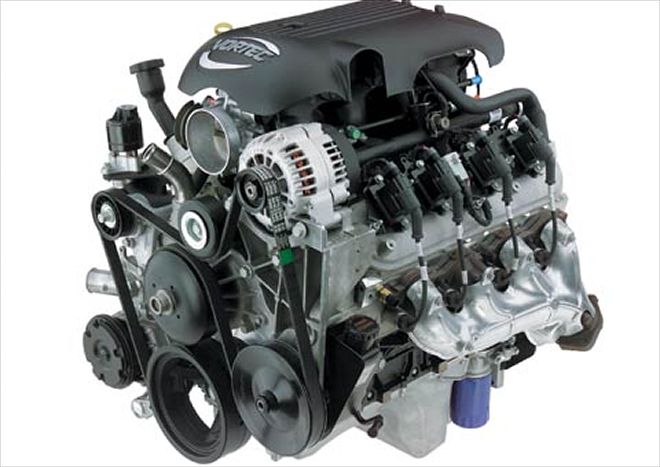
| GM 6.0L GasolineClick image to enlarge
GM 6.0L Gasoline Engine type: V-8, cast-iron block, aluminum heads
Bore x stroke, in: 4.00 x 3.62
Displacement, ci/L: 366/6.0
Compression ratio: 9.4:1
Valve gear: 2 valves/cyl, OHV
Fuel induction: Sequential multiport
Horsepower, hp @ rpm: 300 @ 4400
Torque, lb-ft @ rpm: 360 @ 4000
Recommended fuel: Unleaded regular
Max GCWR, lb: 16,000
Max towing capacity, lb: 10,500
Option price: Standard
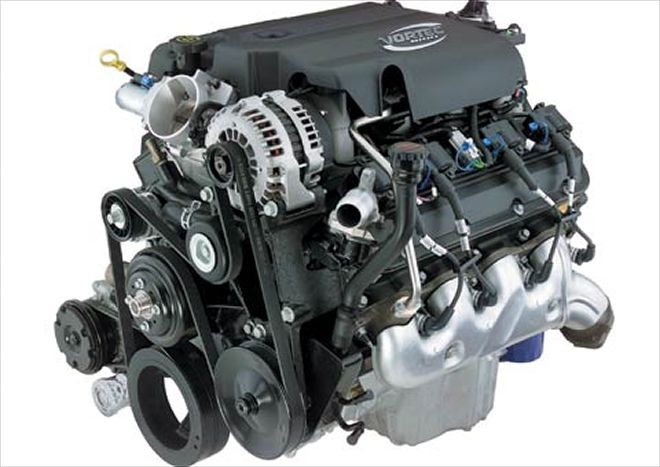
| GM 8.1L GasolineClick image to enlarge
GM 8.1L Gasoline Engine type: V-8, cast-iron block and heads
Bore x stroke, in: 4.25 x 4.37
Displacement, ci/L: 496/8.1
Compression ratio: 9.1:1
Valve gear: 2 valves/cyl, OHV
Fuel induction: Sequential multiport
Horsepower, hp @ rpm: 340 @ 4200
Torque, lb-ft @ rpm: 455 @ 3200
Recommended fuel: Unleaded regular
Max GCWR, lb: 22,000
Max towing capacity, lb: 15,800
Option price: $850
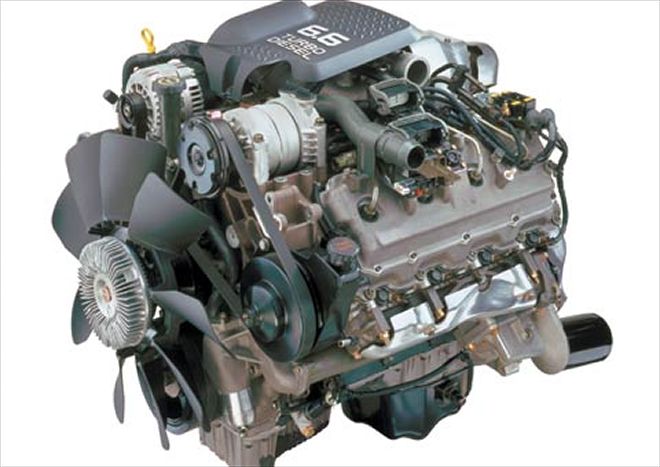
| GM 6.6L TurbodieselClick image to enlarge
GM 6.6L Turbodiesel Engine type: V-8, cast-iron block, aluminum heads
Bore x stroke, in: 4.06 x 3.90
Displacement, ci/L: 403/6.6
Compression ratio: 17.5:1
Valve gear: 4 valves/cyl, OHV
Fuel induction: Direct injection, high-pressure common rail
Horsepower, hp @ rpm: 300 @ 3100
Torque, lb-ft @ rpm: 520 @ 1800
Recommended fuel: Diesel
Max GCWR, lb: 22,000
Max towing capacity, lb: 15,800
Option price: $4810 ($1200 for Allison 1000)
Dodge The 2500 and 3500 Dodge Ram Heavy Duty trucks are the newest 3⁄4- and 1-ton offerings on the road. We criticized the 1500 Ram for not having enough power when it was introduced last year with the 5.9L/245-hp as the top engine. Dodge promised more powerful engines for the 2500/3500 platform, and they came through. The base engine is the new 5.7L gasoline V-8 that's not only the most powerful base engine of this group at 345 hp, but revives the historical Hemi name and accompanying hemispherical cylinder head combustion chambers. Next up is the 8.0L gasoline V-10. It's basically a Viper engine with iron heads that makes 310 hp and 450 lb-ft of torque. The first diesel option is a 5.9L I-6 good for 250 hp and 460 lb-ft (specs not shown). It costs around $4700. However, we'd advise spending about $600 more to get the H.O. version of the 5.9 I-6 diesel. This Cummins design offers the most torque of any production pickup engine at 555 lb-ft.
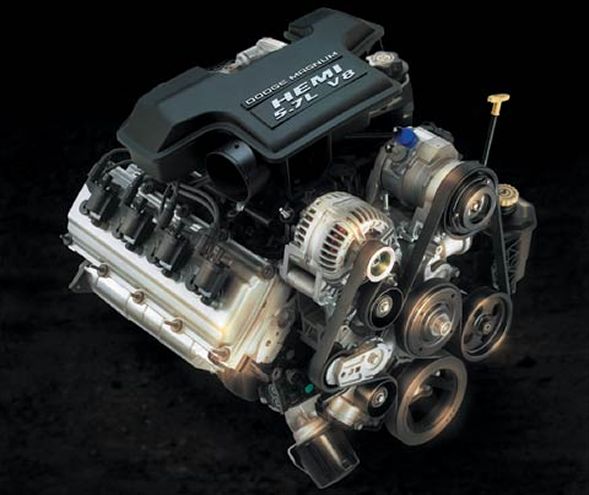
| Dodge 5.7L GasolineClick image to enlarge
Dodge 5.7L Gasoline Engine type: V-8, cast-iron block, aluminum heads
Bore x stroke, in: 3.92 x 3.58
Displacement, ci/L: 345/5.7
Compression ratio 9.6:1
Valve gear 2 valves /cyl, OHV
Fuel induction Sequential multiport
Horsepower, hp @ rpm 345 @ 5400
Torque, lb-ft@ rpm 375 @ 4200
Recommended fuel Unleaded regular
Max GCWR, lb n/a
Max towing capacity, lb n/a
Option price Standard 2500 & 3500
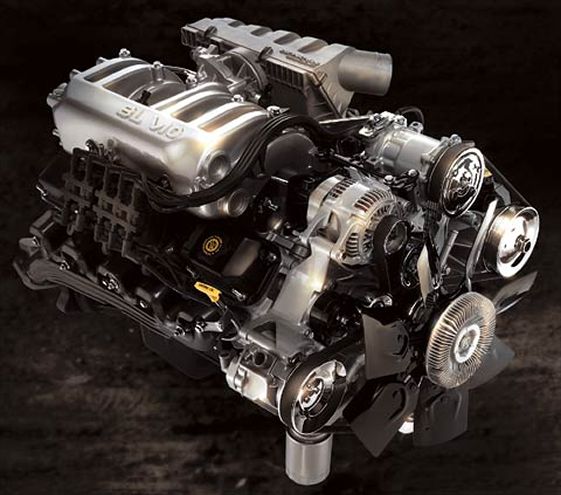
| Dodge 8.0L GasolineClick image to enlarge
Dodge 8.0L Gasoline Engine type: V-10, cast-iron block and heads
Bore x stroke, in: 4.00 x 3.88
Displacement, ci/L: 488/8.0
Compression ratio: 8.6:1
Valve gear: 2 valves/cyl, OHV Fuel induction: Sequential multiport
Horsepower, hp @ rpm: 305 @ 4000
Torque, lb-ft@ rpm: 440 @ 2800
Recommended fuel: Unleaded regular
Max GCWR, lb: 23,000
Max towing capacity, lb: 12,000
Option price: $625 (est)
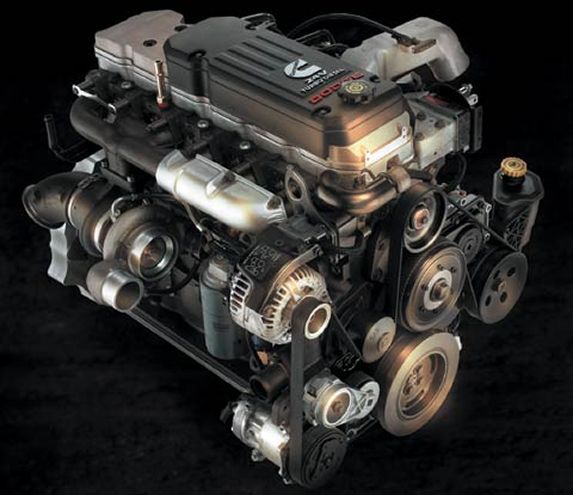
| Dodge 5.9L H.O.TurbodieselClick image to enlarge
Dodge 5.9L H.O.Turbodiesel Engine type: I-6, cast-iron block and head
Bore x stroke, in: 4.02 x 4.72
Displacement, ci/L: 359/5.9
Compression ratio: 17.2:1
Valve gear: 4 valves/cyl, OHV
Fuel induction: direct injection, high-pressure common rail
Horsepower, hp @ rpm: 305 @ 2900
Torque, lb-ft @ rpm: 555 @ 1400 Recommended fuel: Diesel
Max GCWR, lb: 23,000
Max towing capacity, lb: 12,000
Option price: $5300 (est)
Ford Ford pushed the 3⁄4-ton and 1-ton pickup market to where it is today when it introduced its International-engineered PowerStroke diesel engines in 1994. Before these diesels were poorly built and no match for big-inch gasoline engines. Today, 70 percent of SuperDuty Fords are sold with the optional 7.3L V-8 diesel engine. For '02, the 7.3 has for the first time the same horsepower and torque ratings for both automatic and manual: 250-hp and 525 lb-ft. This means the automatic picked up 20 lb-ft. However, the manual only gained 5 lb-ft and actually lost 25 hp. The other optional engine is the worthy 6.8L gasoline V-10. The base engine is a 5.4L gas V-8 that seems strong when installed in an F-150, but struggles when trying to move the mass of an F-250 or F-350, much less a trailer. If you plan on hauling any kind of a load on a regular basis, you'll want the 6.8 or the 7.3. The bottom line regarding Ford is that all its engines are the weakest of the three makes.
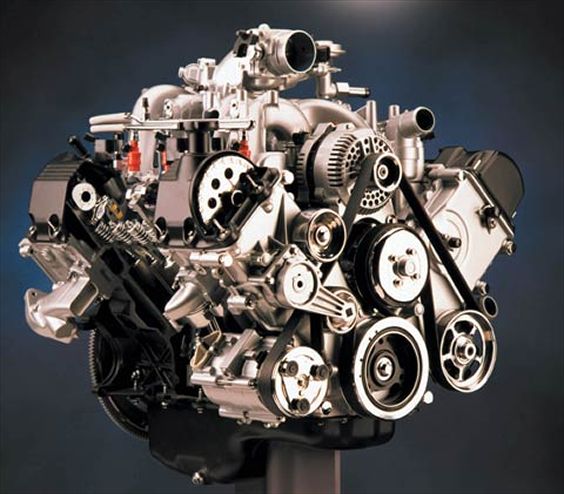
| Ford 5.4L GasolineClick image to enlarge
Ford 5.4L Gasoline Engine type: V-8, cast-iron block and heads
Bore x stroke, in: 3.81 x 4.16
Displacement, ci/L: 330/5.4
Compression ratio: 9.0:1
Valve gear: 2 valves/cyl, SOHC
Fuel induction: Sequential multiport
Horsepower, hp @ rpm: 260 @ 4500
Torque, lb-ft @ rpm: 350 @ 2500
Recommended fuel: Unleaded regular
Max GCWR, lb: 15,000
Max towing capacity, lb: 10,000
Option price: Standard
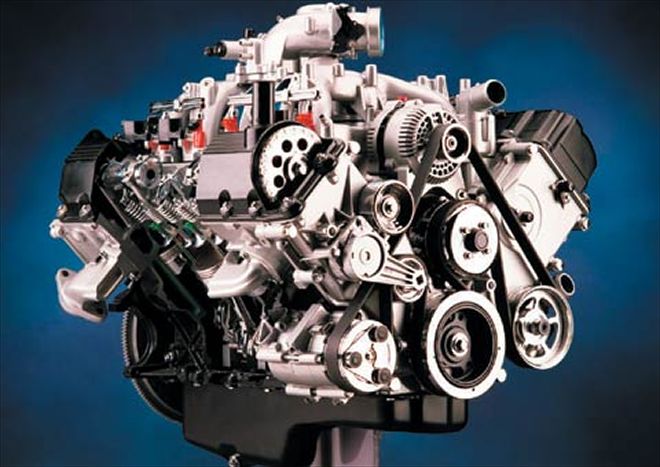
| Ford 6.8L GasolineClick image to enlarge
Ford 6.8L Gasoline Engine type: V-10, cast-iron block, aluminum heads
Bore x stroke, in: 3.55 x 4.16
Displacement, ci/L: 415/6.8
Compression ratio: 9.0:1
Valve gear: 2 valves/cyl, SOHC
Fuel induction: Sequential multiport
Horsepower, hp @ rpm: 310 @ 4250
Torque, lb-ft @ rpm: 425 @ 3250
Recommended fuel: Unleaded regular
Max GCWR, lb: 20,000
Max towing capacity, lb: 13,700
Option price: Standard some F-350, $600 F-250 & some F-350
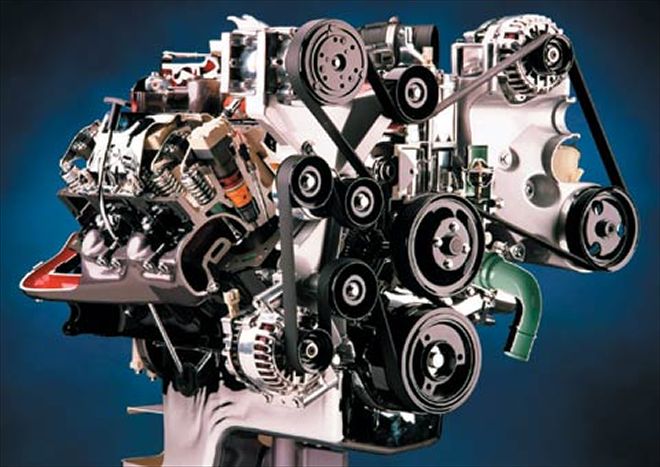
| Ford 7.3L TurbodieselClick image to enlarge
Ford 7.3L Turbodiesel Engine type: V-8, cast-iron block and heads
Bore x stroke, in: 4.11 x 4.18
Displacement, ci/L: 444/7.3
Compression ratio: 17.5:1
Valve gear: 2 valves/cyl, OHV
Fuel induction: Direct injection, high pressure
Horsepower, hp @ rpm: 250 @ 2600
Torque, lb-ft @ rpm: 525 @ 1600
Recommended fuel: Diesel
Max GCWR, lb: 20,000
Max towing capacity, lb: 14,500
Option price: $4840
 | GM 6.0L GasolineClick image to enlarge
GM 6.0L Gasoline
| GM 6.0L GasolineClick image to enlarge
GM 6.0L Gasoline | GM 8.1L GasolineClick image to enlarge
GM 8.1L Gasoline
| GM 8.1L GasolineClick image to enlarge
GM 8.1L Gasoline | GM 6.6L TurbodieselClick image to enlarge
GM 6.6L Turbodiesel
| GM 6.6L TurbodieselClick image to enlarge
GM 6.6L Turbodiesel | Dodge 5.7L GasolineClick image to enlarge
Dodge 5.7L Gasoline
| Dodge 5.7L GasolineClick image to enlarge
Dodge 5.7L Gasoline | Dodge 8.0L GasolineClick image to enlarge
Dodge 8.0L Gasoline
| Dodge 8.0L GasolineClick image to enlarge
Dodge 8.0L Gasoline | Dodge 5.9L H.O.TurbodieselClick image to enlarge
Dodge 5.9L H.O.Turbodiesel
| Dodge 5.9L H.O.TurbodieselClick image to enlarge
Dodge 5.9L H.O.Turbodiesel | Ford 5.4L GasolineClick image to enlarge
Ford 5.4L Gasoline
| Ford 5.4L GasolineClick image to enlarge
Ford 5.4L Gasoline | Ford 6.8L GasolineClick image to enlarge
Ford 6.8L Gasoline
| Ford 6.8L GasolineClick image to enlarge
Ford 6.8L Gasoline | Ford 7.3L TurbodieselClick image to enlarge
Ford 7.3L Turbodiesel
| Ford 7.3L TurbodieselClick image to enlarge
Ford 7.3L Turbodiesel